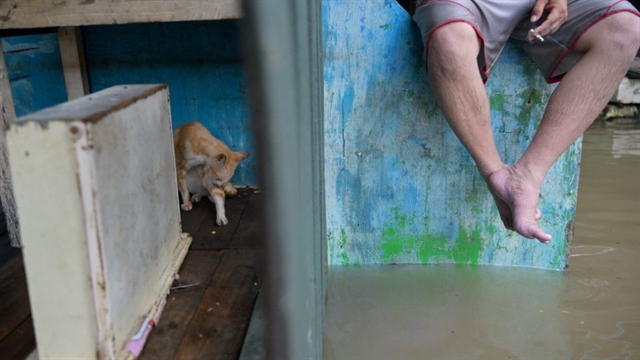 World
World


|
| A cat cleans itself as a man smokes in a residential area in Jakarta on February 29, 2024. PHOTO: AFP |
JAKARTA – The city administration is currently drafting a new regulation to tighten restrictions on smoking in public spaces in an aim to protect the public from the harmful effects of tobacco smoke, especially vulnerable groups like children and pregnant women.
Jakarta Governor Pramono Anung said the main goal of the new regulation was to restrict smoking in crowded public spaces, such as office buildings and shopping malls.
“We are not imposing a total ban on smoking in these establishments, but we will provide designated smoking areas,” he said on Thursday, adding that city councilors had endorsed a plan to extend smoking restrictions to entertainment venues including karaoke lounges, nightclubs and live music cafés.
The governor pointed out that a similar regulation had been implemented successfully in major global cities such as Tokyo, Seoul and San Jose, California.
“These policies have proven effective in creating cleaner and healthier public spaces and in minimizing the harmful effects of secondhand smoke on nonsmokers,” he said.
The draft regulation also outlines sanctions for students caught smoking, whether on school grounds or in public spaces. Proposed penalties include the termination of city-sponsored scholarships for registered beneficiaries of the Jakarta Smart Card (KJP) Plus program.
In addition to restricting smoking in public spaces, the draft regulation contains public education and awareness strategies on the dangers of smoking. These efforts include collaborations with public figures, nongovernmental organizations and digital influencers, as well as coordinating with workers at Puskesmas (community health centers).
Further, a health class on the harmful effects of tobacco and e-cigarettes will be integrated into the curriculum across all levels of education in Jakarta, from primary to tertiary.
Jakarta Health Agency head Ani Ruspitawati explained that the proposed regulation distinguished two types of smoke-free zones.
The first covers spaces where smoking is entirely prohibited, such as health facilities, schools, playgrounds, houses of worship, public transportation and sports venues.
The second allows smoking in designated areas as long as these are located outdoors, physically separate from main buildings, away from heavy foot traffic and far from entry and exit points. This zone is permitted in places like office buildings, integrated public spaces and certain event venues, such as concert halls.
“The regulation will also prohibit the sale of cigarettes within 200 meters of school zones and playgrounds, as well as ban the public display of cigarettes in shops,” Ani said on Thursday, as quoted by Kompas.com.
Meanwhile, violators could be fined between Rp 250,000 (US$15) and Rp 50 million depending on the severity of the offense.
“This regulation will only serve as an effective deterrent [to curbing tobacco consumption] if enforcement is both strict and continuous,” Ani emphasized.
Since 2005, the city has issued two gubernatorial regulations to restrict smoking in public spaces, including health facilities, schools, offices, playgrounds and public transportation, but the lack of clear sanctions coupled with lax monitoring and enforcement has undermined their effectiveness.
According to a 2024 report from the World Health Organization, Indonesia ranks among the world’s largest cigarette markets, with a high prevalence of young smokers and a staggering 35.4 percent of adult tobacco users, or more than 70 million Indonesians.
A 2021 study by the Center for Indonesia’s Strategic Development Initiatives (CISDI) found that smoking-related illnesses saddled the country with an annual disease burden of Rp 27.7 trillion. THE JAKARTA POST/ANN




